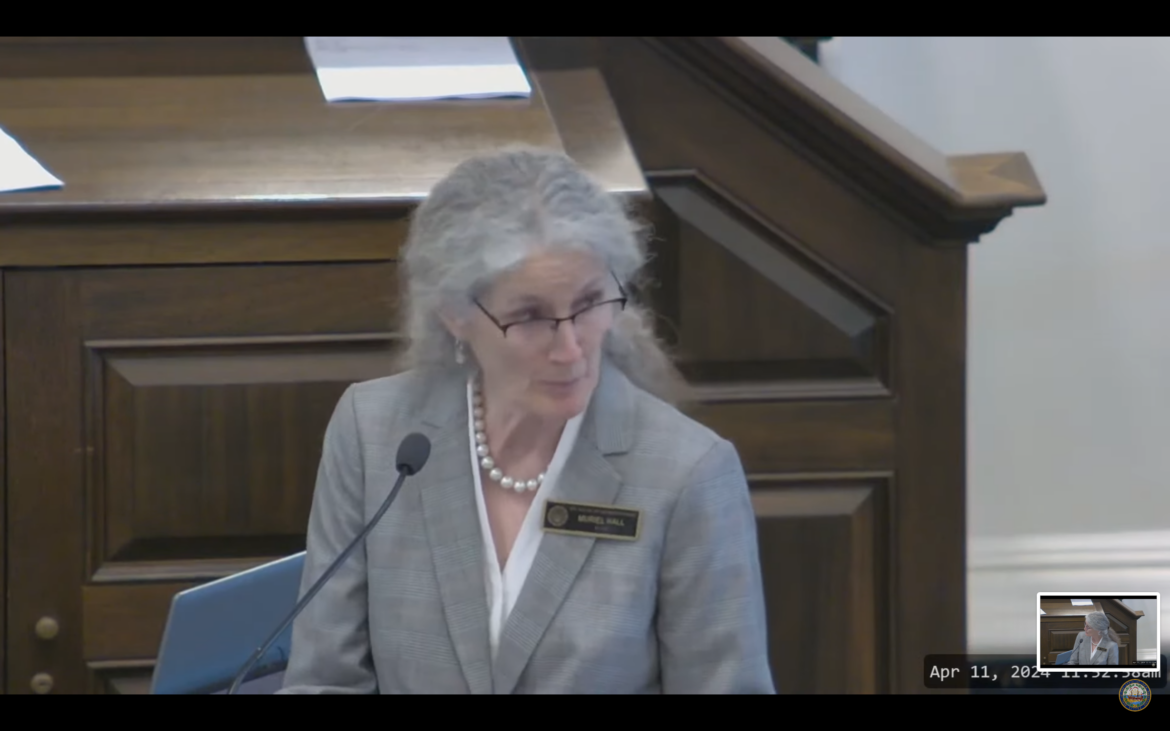By GARRY RAYNO, InDepthNH.org
CONCORD — By the slimmest of margins, the House defeated two bills that would address homelessness and hunger among students and young people Thursday.
House Bill 1212 would have had the state provide free school lunches to children whose families earn up to 350 percent of the federal poverty level — also the current cap for the Education Freedom Account program — but Republican House Speaker Sherman Packard added his vote to those who wanted the bill tabled which would kill it as Thursday is the last day to pass House bills to the Senate or Crossover.
The bill was tabled on a 192-191 vote, with the Speaker casting the deciding vote. The Speaker usually does not vote, but may vote to break a tie or create a tie keeping the bill from passing or failing.
Earlier in Thursday’s session Rep. Mel Myler, D-Hopkinton, in a tribute to House member Arther Ellison, D-Concord, who died last month, ended with what Ellison said about the bill when he was in hospice treatment, “feed the damn kids.”
But the House Finance Committee had recommended the bill be killed saying it would cost — according to the Department of Education — from $50 million to as much as $100 million a year to provide one meal a day, breakfast or lunch, to approximately 37,000 students who would qualify under the increase in eligibility.
Supporters of the bill said food insecurity has long-term effects on students’ mental and physical health, as well as learning.
“New Hampshire is a wealthy state,” said Rep. Mary Heath, D-Manchester, “feeding hungry children should be a priority for the New Hampshire House.”
But opponents said the cost would be fiscally irresponsible for a problem that may not exist in the state and would require additional personnel at the Department of Education to administer.
The money would have come from the Education Trust Fund which currently has about a $200 million surplus.
Bill supporters were planning to introduce an amendment that would have reduced eligibility to 250 percent of the federal poverty level to reduce the cost of feeding fewer children but did not have that opportunity when the bill was tabled.
The cap at 350 percent would be about $105,000 for a family of four and the 250 percent cap would be about $80,000.
Initially the House passed the bill on a 198-174 vote, but it was referred to the Finance Committee for review before a final vote.
The House also defeated House Bill 1199, which would have added a position to the Office of the Child Advocate to focus on homelessness for those between the age of 13 and 25 years old.
The money for the position would come from American Rescue Plan Act funds that need to be spent by the end of the year.
Rep. Chuck Grassie, D-Rochester, said youth homelessness in New Hampshire — which is in the top three in the country — is a critical issue with one in 10 homeless and many more are home insecure.
He said the youth addressed in the bill fall outside the current system, do not usually receive services, and are at greater risk for sex trafficking, noting the child advocate’s office said the group includes a higher level of LGBTQ youth.
Grassie said the person in the new position would work with state and local officials to address the housing needs of this population.
He said in 2022 there were 1,500 homeless children, with 40 percent participating in survival sex for a place to stay or a meal.
Grassie said 25 percent of homeless college students participate in survival sex for the same reasons.
But opponents said using one-time federal COVID money to pay for a position the state will have to fund going forward is bad fiscal policy.
Rep. Joe Sweeney, R-Salem, said the bill would not spend money for one additional bed or one additional shelter, but will put the taxpayers on the hook to continue to fund the position.
He also said the bill would also expand the scope of the office up to 25 years of age with the one-time money.
The House at first defeated the Finance Committee’s recommendation to kill the bill by one vote, and then failed to pass the bill by one vote when Packard voted against it.
Eventually the House indefinitely postponed the bill on a 192-190 vote.
The House also refused to suspend its rules to accept Senate Bill 523 which was similar in content to a bill the House had indefinitely postponed earlier this session, which would have set up a new system to challenge both books and educational material in public schools and their libraries.
The Senate version was nearly the same as the bill the House killed earlier this session and with its vote prohibited similar topics to come before the House for the remainder of the two-year term.
Opponents to both the House and Senate bills called them book bans, although supporters objected to the characterization.
The House did pass a bipartisan bill allowing districts to decide what materials and books are appropriate, but also guaranteed students access to available materials.
Garry Rayno may be reached at garry.rayno@yahoo.com.






